Text
Types of dumplings in China
Prior to my arrival to China, I only knew about wonton and jiaozi, which I assumed to similar to pelmeni.
As it turned out, there is no end to the variations of dumplings, so here are some of the most common dumplings in China that I've come across so far!
饺子 - jiǎozi
These are thin veggie or meat filled dumplings, and they can be steamed, boiled or fried but I've only tried the steamed variety so far which is pretty tasty. They somewhat resemble pelmeni, but the tast is noticeably different.
馄饨 - húntún (wonton)
These dumplings are similar to jiǎozi but thinner and they're usually eaten in soup.
生煎包 - shēngjiānbāo
These are slightly crispy, fried dumplings usually with a pork-filling。
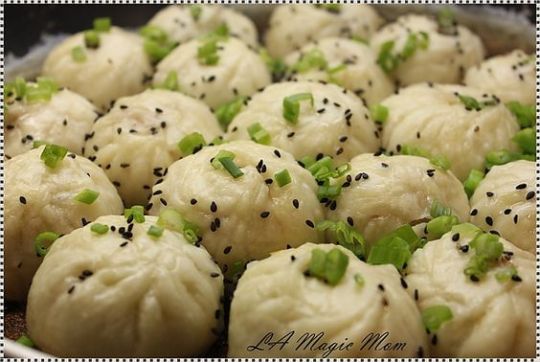
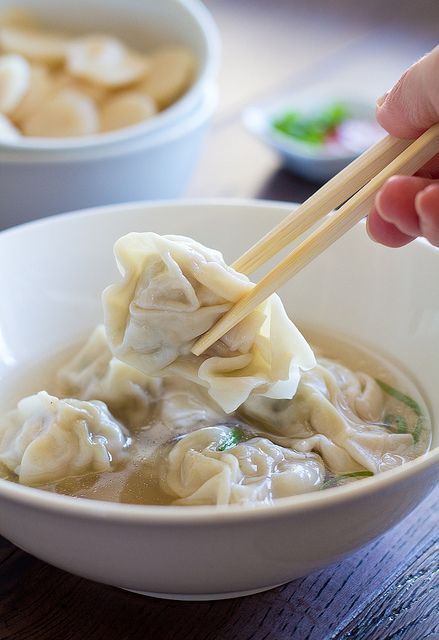
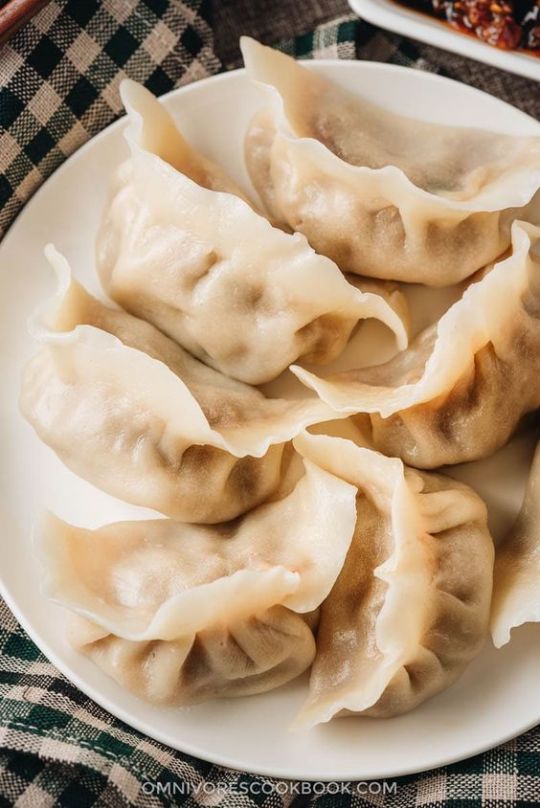
锅贴 - guōtiē
These dumplings are the crispy-ish type, deep-fried and steamed with various fillings like veggies and meat.
水饺 - shuǐjiǎo
They're quite similar to the 锅贴, but these dumplings are boiled (note the 水) without the frying.
小笼包 - xiǎolóngbāo
These are steamed buns, usually filled pork but they can also have other fillings like veggies and seafood.
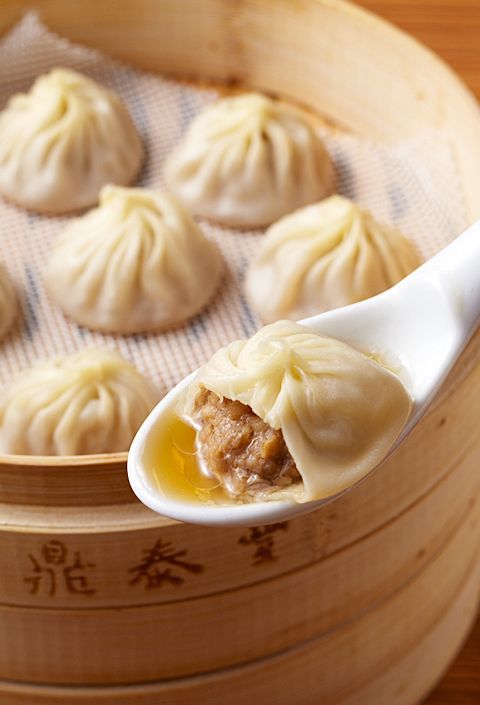
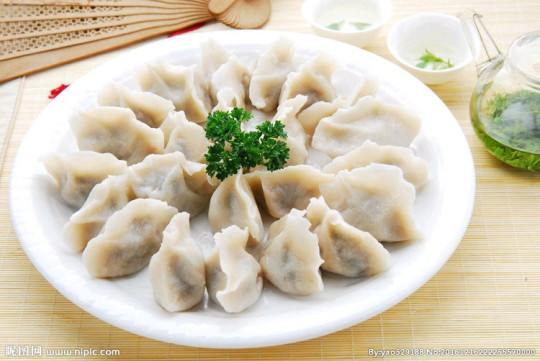

Honourary mentions:
These aren't dumplings, but they're adjacent enough imo.
肉包子 - ròubāozi
These are biggish steamed buns with a meat filling. I have these for breakfast and they're really good.
菜包子 - càibāozi
Same as the ròubāozi, but with veggies and also pretty tasty.
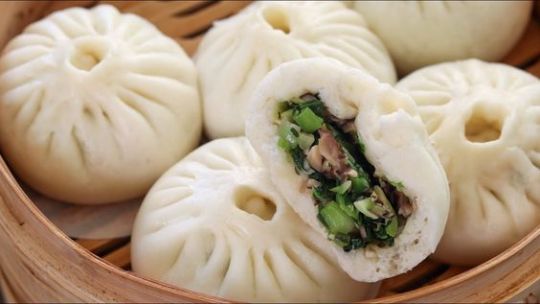

If I missed any, let me know which ones as I'm always looking to try new things!
200 notes
·
View notes
Text
"Alright, time to see what this animated poetry movie is like-
Oh jesus christ"
36K notes
·
View notes
Text
你好, 我最近很忙,但我还在学一点中文。搬家后我想发更多帖子 🥲
#mandarin#chinese#chinese language#language#chinese langblr#langblr#chinese learning#mandarin chinese#mandarin langblr
18 notes
·
View notes
Text
My biggest tips if you're learning Chinese and starting to read Chinese webnovels (this list is not all inclusive, I'm sure there's things I forgot to mention):
Download Pleco app and use the free Clipboard Reader to copy/paste in text to read (or purchase the Pleco Reader tool which is what I did). Pleco has click translations (and great dictionaries), a Dictate Text text to speech button (good for listening to pronunciation while reading), a Google translate whole-section button (good for if you understand individual words but not the overall sentences/paragraphs), and it's just very Reader friendly. Pleco also has many graded readers to purchase if you'd like to first read 100, 300, 500, 1000, 1500, 2000 unique character graded readers Before trying webnovels. Alternatively: download the app Readibu. You can open webnovel url links in Readibu, and the app has click translations and can give you pronunciation of individual words. The app also has a Statistics button that tells you what percentage of words in a given chapter is in what HSK level. This can help you determine if a novel is your reading level. For example if you are reading level HSK 4, and open a novel with 90% words in HSK 4 or below? Good choice to read. If you open a novel and rhe app says it's 80% words HSK 4, 15% HSK 5, 3% HSK 6 and the rest above HSK? Then that novel may be a more difficult reading choice. Readibu lets you explore their app to find some webnovels, but you can also simply paste in a url of any novels you've found online. The paid version of readibu has additional tools like full-sentence machine translation.
Google/search the following terms when looking for novels: the Chinese version of the novel name, and xiaoshuozaixian 小说在线. So for example to find Guardian by priest, I might go to novelupdates.com Guardian page and find the Chinese name listed there for it Zhen hun 镇魂. Then I would go to google/duckduckgo/searx.space and search "镇魂小说在线" I may also include the author name "priest" if needed. One of the first results is likely to be jjwxc site where priest published it. There should also be additional results, if you're looking for say a chapter that got locked on its original publishing site etc or need a site that is more compatible with whatever Reader app you're using (Pleco, Readibu, other). Qidian and Jjwxc are major webnovel sites.
For that matter, do you want to listen to the audiobook as you read? Go to a search site again like Google, and type the book name in chinese along with 有声读物 youshengduwu or 有声在线 yousheng zaixian or 有声书 youshengshu. You could also search using those terms in youtube or bilibili. Ximalaya and Himalaya apps also have a lot of audiobooks, but I've noticed this year a lot of region blocks on stuff in ximalaya. So I usually listen to audiobooks on bilibili.com now.
If you are reasonably comfortable in your Chinese reading skills and are able to understand what you read even if word-translations are only right 80% of the time? Then you can expand what applications you read in. ANY ebook Reader app is likely to have click-translate features, you may need to download additional language dictionaries (Kindle app requires this) or you may just need Google Translate/DeepL/some translation app installed on your phone. Then you can open up any Reader app of your choice (I like Moon+ Reader personally) and you'll have click translate, sentence machine translate (using the translation app installed), and Text To Speech for the passages. The translation quality is likely to be worse than Pleco and Readibu, and will probably be roughly as good as Google Translate quality. But it is usable if you are upper beginner or above and know enough to recognize when a translation looks suspiciously wrong. Idiom app also has this level of translation quality (free), and Lingq has this translation quality for chinese (I don't use lingq because it's a paid subscription but the Chinese word translation quality is as poor as Google translate so I'd just rather use free tools that use Google translate at that point). You can also simply read IN your web browser in Chrome, Firefox, or Edge. In all of those, if you have Google Translate/DeepL/any translation app installed, then you can hold down and click words for the option to click translate. You can also highlight whole sections of text to machine translate the sections. Microsoft Edge actually has one positive in this regard: Edge has the feature Read Aloud that uses text to speech to read a web page. And Edge's text to speech sounds WAY better than any other tts service I've used. In addition, if you read using Edge on the computer, their Read Aloud TTS has multiple voice options on computer version of Microsoft Edge and in Microsoft Word. If you plan to heavily utilize TTS tools, I think Edge's tts sounds the best by far.
If you would really like to study with a parallel text translation? I recommend the app I'm currently using daily: Parallel translations of books by Kursx. It is free. It has click translation, TTS for individual words and per sentence, it has parallel translation per sentence (resulting in some of the most easy to read machine translations I've seen, and it helps if you know individual words but can't parse the grammar). It has a unique word count statistics for the book, as well as total word count, list of words by frequency (if you want to pre study vocabulary), percentage of book read, estimate of time remaining to read (I love seeing this number go down), how often you're looking up words (useful to notice if a book is more or less difficult for you). You can import txt or epub files to read. I personally suggest looking up novel names in chinese plus 小说 xiaoshuo (novel) plus "txt" to find text downloads, or copy pasting text from a website into a txt file to then read in this app. Or go to a site with epub downloads and search for the book you wish to read. The parallel text translation and Dictate Text tts functions are my favorite parts about this app. But the statistics page for the books I also find highly motivating.
A tip about reading: when reading any machine translations to help you, be aware of the following common mtl mistakes. First, mtl may struggle to notice if a Chinese name/place is a name or an item. Examples would be Li Lianhua potentially being translated by a mtl as Li Lotus, instead of the mtl recognizing it as a name and leaving it as Li Lianhua. Mtl are likely to struggle a lot with names and sometimes switching them to object/verb word translations so it may be a good idea to read after checking the names of people in the novel, or if you see a word translated weird then be mindful it might actually be someone's name. (Guo Changcheng's name often gets translated to Guo Great Wall by mtl). Second, mtl often mixes up gender of pronouns 他她它. Please go into Chinese reading already aware of which ta is he, she, or it. So that when you run into this mtl error, you can check for yourself which pronoun the ta was meant to be. Third is also pronoun related: English sometimes needs a pronoun in a sentence when Chinese does not. In those cases, mtl will often just make up one and use he/she/it/you/me/they when no word is present in the Chinese. In some cases this is fine and the meaning is the same. In other cases it wildly changes the meaning of the sentence. In these cases, look to the previous Chinese sentence to determine what noun the following sentence is about. Then you can determine which noun would have Actually been used in a correct English translation. Then you will know if the mtl translation is right or wrong. Fourth, like the last issue mentioned, mtl will struggle with sentences in chinese that require less words than the English equivalent. In any cases like this, be aware the mtl will add English words without those necessarily have anything to do with the actual meaning of the sentence. It may change the sentence meaning significantly. In these cases also, it's good to look at the last few sentences and then determine the most likely meaning of the current sentence, to judge if the mtl is roughly correct or Very Wrong. Fifth thing to be aware of: some machine translation tools will simplify translations. By this I mean they will turn long imagery lines or idioms into shorter single words sometimes. It greatly depends on which mtl you use, and if the mtl is trying to preserve detail (which would mean preserving the long line of imagery) or sacrificing detail for a more roughly correct translation. By this I mean that it's easy for an mtl to mess up a line as complicated as "He was stiff as a coffin" with so many words to incorrectly translate and implications, so some mtl will change to "He was stiff" and leave out some words. When I used to use Baidu translate it had a habit of doing this a LOT. Where if I looked up each word/phrase individually I would get a lot of detail, but if I put in a whole paragraph then many lines like chengyu and imagery of "hairs standing up from head to tail" would translate to MUCH shorter one word or short phrases like "scared" and so much detail was lost. Google translate and DeepL ALSO seem to do some deletion of details with longer passages. I have been using the KursX app for machine translation lately because since it translates each sentence individually, it tends to preserve most details. Whereas I've seen many mtl tools start deleting or summarizing details if you put a longer passage into them. So if you use any machine translation for phrases, sentences, or paragraphs, and you notice words you individually translated are NO longer in the machine translated output? It's possible the mtl is deleting details or summarizing details. If this is the case, a way to find the original details again is to either shorten the input into the mtl (to very short phrases bit by bit in the sentence), or by looking up each individual word in a sentence.
Bilibili Comics app is great if you like reading manhua. You can read comics in Chinese (just click the Chinese language option), and then go read the English translations if you need clarification of something. The app gives you icon dress up rewards for reading, which kind of let's you gamify your studying into fun little decorative rewards if you push yourself to keep reading.
781 notes
·
View notes
Text
After passing peer review here is my drama recommendation tool

Maybe I will update it in the future but for now I am happy to have watched enough good dramas to make it.
3K notes
·
View notes
Text
Chinese Verbs Cheat sheet: B's
My quick guide to the most common B- verbs in Chinese!
Bake - 烘烤 - hōng kǎo
Be - 是 - shì
Belong to - 属于 - shǔyú
Begin - 开始 - kāishǐ
Believe - 相信 - xiāngxìn
Become/ turn into - 成为 - chéngwéi
Boil - 煮熟 - zhǔ shú
Blame - 责备 - zébèi
Break - 打破 - dǎpò
Bring - 带来 - dàilái
Build - 建造 - jiànzào
Burn - 烧 - shāo
Buy - 买 - mǎi
156 notes
·
View notes
Text
Mandarin Chinese Pronunciation tip: ǒóōò
The "o" vowel sound in words like 我 wǒ, 拨 bō, and 破 pò is pronounced like the "o" in English words like "horse" or "lore."
It is not pronounced the "o" in "go."
22 notes
·
View notes
Text
Welcome to linghxr
For my 250th post on this blog, I created a new pinned post to introduce myself!
About me:
I’m a Chinese American learning Mandarin Chinese to connect with my family and heritage.
I started learning Chinese at a young age but became more serious about it in college. My native language is English.
Interests: Cpop/Mandopop, Chinese idol survival shows & reality singing shows, cdramas (mostly suspense/mystery/crime genres)
My top resources:
Pleco Chinese dictionary app
Anki flashcard software & mobile app
MDBG Chinese dictionary
教育百科 Chinese dictionary
Zhongwen browser extension
Readibu app
Chinese Grammar Wiki
Chinese Zero to Hero YouTube channel
每日中文课Free To Learn Chinese YouTube channel
If you are on my blog, click the tags below to see posts on topics I often post about!
348 notes
·
View notes
Text
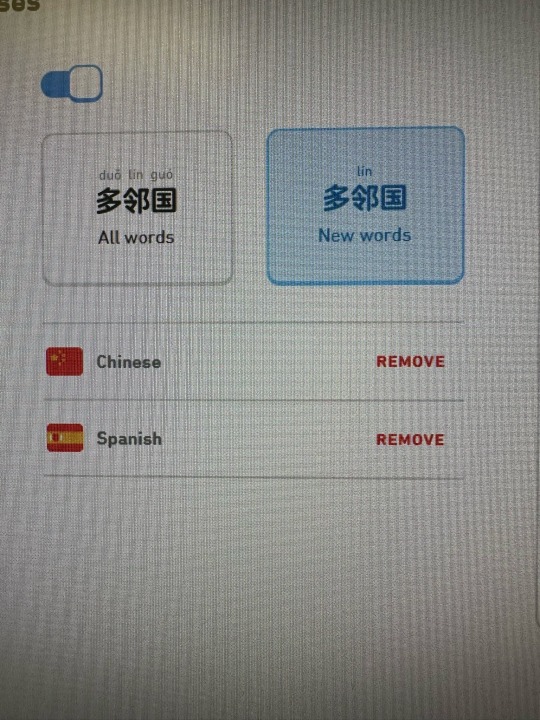
I once saw someone make a post about how frustrating it is that Duolingo shows the pinyin all the time—in the settings on a computer for duolingo, there is an option to turn off the pinyin except for new words. Just thought this would help anyone using duolingo (I’ve been using it for vocab and basic grammar in addition to other sources) !
#mandarin#chinese#chinese language#langblr#language#mandarin chinese#mandarin langblr#chinese learning#chinese langblr#duolingo
0 notes
Text
language learning culture is always watching children’s media in various languages
458 notes
·
View notes
Text
Why Mandarin?
Wanting to learn Mandarin started with my love of Traditional Chinese Medicine (TCM).
I spent almost a year teaching in Korea. In that time, I had to visit a "chiropractor" there, who was just a TCM practitioner. All of a sudden, I was thrown into the literal miraculous nature of acupuncture, cupping, and herbalism. I became obsessed! Studied acupressure points and meridians at home, began researching herbs and how TCM uses them, pulse diagnosis, etc. It became my mission to become a TCM doctor, and in this as I researches schools, I began learning about Chinese culture. Unfortunately during my time in Korea I was not able to visit Taiwan, China, Singapore, or any other Mandarin speaking place, but I was able to see it's influence in the city I lived in. The more I studied it and noticed it, and it's influence on Korea and Korean history, the more I fell in love! :)
7 notes
·
View notes
Text
I am very seriously struggling with deciding on learning traditional or simplified first 🥲 pls lmk if y’all have any insight! I understand the pros and cons of both mostly, except from other people’s experiences. I’ve heard regrets on both sides of learning whichever first, I’ve heard people say learning one first makes the other easier on both sides, etc. I just have no idea!
12 notes
·
View notes
Note
What are those apps you usually post in your productivity updates?
hi! here's a breakdown of apps i use, as well as websites and other resources i've used/use for my learning (mainly chinese, though some of these resources can be used for other languages as well).
apps i use every day:
dot languages: this is a chinese-specific app where you select your hsk level, and then read articles at that level. there's a pop-up dictionary, an option to show pinyin, post-article vocab practice (audio, matching, translation, and writing), and the option to have your articles either in simplified or traditional.
TOFU learn: a blend between flashcards and writing, you can find decks for various things, including hsk level-specific decks, and you learn new vocab with the stroke order and then write each new term three times—once with an overlay (so the term is visible), and then two times from memory. there's also a review function, which helps you practice terms you've already learnt, and each term has audio that goes with it. i use it for chinese, but there's decks for esperanto, french, german, italian, japanese, korean, norweigian, portuguese, russian, spanish, swedish, and turkish.
the pleco dictionary app: my favourite chinese dictionary app; allows you to translate from english to chinese or chinese to english, has options for writing, radical, vocal, and keyboard entry, and has both traditional and simplified characters.
ankiapp: this one's not particularly complicated; it's a flashcard app, where you can make your own decks or download decks other people have made. it uses a spaced repetition system to help you remember terms—you rate yourself from worst to best on how well you remembered the term, and that determines how many times it'll pop up afterwards. it also gives you an overall grade for each deck, which is a nice way to measure your progress.
duolingo: probably my least favourite of all of the apps i use; the chinese course isn't the best, and now that they've removed the notes/grammar information option, there's no way for people who aren't already fairly familiar with the language and its inner workings to learn them if they exclusively use duolingo. it's okay for maintenance practice, though, but i'm already almost finished with the entire course and i would say it barely reaches to lower hsk 4, so i wouldn't say it's a good tool if you're more advanced.
apps i have but use less often:
readibu: this is sort of like dot in that it's an app for reading in chinese with a pop-up dictionary. however, that's where the similarities end; readibu has novels, short stories, and articles aimed at children, and each of those are further split into genres. readibu also lets you add your own web-pages and read them on the app, so you can use its pop-up dictionary with them. it's aimed more to intermediate and upper intermediate learners, with hsk levels ranging from hsk 4 to hsk 6. the only reason i rate dot above readibu is because dot has a larger range of levels (hsk 1 through hsk 6 i believe? but it may go higher) and exercises built in to help you learn the vocab.
the chairman's bao: also a chinese reading app, though if you use the free version, you only get one sample article per hsk level (hsk 1 - hsk 6). i believe that every so often you get a new sample article for each level, but i'm not sure what the interval on that is. it also has a pop-up dictionary and a flashcard option for saved vocab.
du chinese: another chinese reading app; it has articles divided into newbie through master (six levels in total, though they don't line up perfectly with the hsk in my experience), and new articles are free for a certain period of time before becoming locked behind a paywall. there's a pop-up dictionary and a vocab review/test option for vocab you save.
memrise: flashcards with audio, depending on whether you're using an official course or a user-generated deck. decent, but it can get repetitive.
hellotalk: not exclusively chinese, but i believe it started off mainly aimed that way. you set your language, and then your target language, and then you can talk to native speakers who have your language as their target language. potentially incredibly useful, but if you're like me and extremely introverted you may have a hard time using this app, since it requires a lot of one-on-one interaction.
slowly: i haven't actually gotten around to using this, but it's sort of like a digital penpal app, as i understand it. you can learn more about it here.
websites and other miscellanea:
this massive mega drive by @salvadorbonaparte (languages, linguistics, translation studies, and more).
this masterpost by @loveletter2you (linguistics, languages, and language learning books/textbooks).
this masterpost on chinese minority literature by @zaobitouguang
the integrated chinese textbooks by cheng and tsui, which are the textbooks i use for self-study—there's textbooks and workbooks, as well as character workbooks (though these can easily be cut out without suffering from the loss).
mandarinbean: graded readers, hsk 1 - hsk 6, with a pop-up dictionary and the option to read in traditional or simplified
chinese reading practice: reading, beginner through advanced (three levels), with a pop-up dictionary and some additional notes included on vocab and language-specific things non-native speakers might struggle with or not know.
hsk reading: graded readers, hsk 1 - hsk 6, divided into three sections (beginner, intermediate, advanced). does not have a pop-up dictionary, but does have an option to translate the text, post-reading quizzes, and notes on important vocab with example sentences.
my chinese reading: reading from beginner to advanced (four levels); has a pop-up dictionary, the option to play an audio recording of the passage you're reading, notes on key words, things that are difficult to translate, grammar, and post-reading comprehension questions.
the heavenly path notion website, which i would say is one of the best resources i've ever found, with a massive number of guides, lists of chinese media in a variety of forms, and general resources.
chinese character stroke order dictionary: what it says on the tin; will show you the stroke order for a given character.
hanzigrids: allows you to generate your own character worksheets. i use this very frequently, and can recommend it. the only downside is if you want to create multiple pages at once, you have to pay; however this can easily be circumnavigated by creating only one sheet at a time. you can download the sheet as a pdf and print it out for personal use.
21st century chinese poety: a resource i only came across recently; has a massive collection of contemporary chinese poetry, including translations; much more approachable than classical poetry, which can often be incredibly dense and hard to parse due to the writing style.
zhongwen pop-up dictionary: if you're reading something in chinese on a website that doesn't have a pop-up dictionary, this is a must. i've never encountered any words that it doesn't have a translation for so far, including colloquialisms/slang. i use it to read webnovels, and it's been a fantastic tool. you can also save vocab by hitting the r key when you're hovering over a word/phrase, making it easy to go back and add terms to your flashcard deck(s).
chinese reading world: a website put together by the university of iowa; split into three levels (beginner, intermediate, and advanced), with thirty units per level, and ten modules per unit, as well as multiple proficiency tests per level. each module is split into three parts: a pre-reading vocab quiz, the reading with a number of comprehension questions based on it, and a post-vocab reading quiz. it also rates you in relation to someone with a native proficiency based on how quickly you read and answer the comprehension questions, and how many vocab questions you get right.
jiaoyu baike: an extensive chinese-to-chinese dictionary, put out by the taiwanese ministry of education. you can find an extensive write-up on it here, by @linghxr.
social media etc: see this post by @rongzhi.
qianpian: another chinese-to-chinese dictionary; @ruhua-langblr has a write-up on it here.
this writeup on zero to hero by @meichenxi; initially aimed at chinese learning, but now has expanded greatly.
music rec's: this masterpost by @linghxr.
tv/film: youtube is a great place to find chinese tv shows and films, and they often have english subtitles. if you can't find something on there, though, you can probably find it either on iqiyi or asianvote, which have both chinese and other asian shows and films (though you'll want an adblock if you're going to use the latter). i use these a lot to watch things, and have discovered a lot of media through these, and then novels through those when i went searching to see what they were adapted from.
polylogger: a website for logging the amount of time/type of language study you do. has a wide variety of languages, and the option to follow other people. still, it's a fairly basic site.
290 notes
·
View notes
Text
Mandarin Name?
Get a Chinese Name (mandarintools.com)
I was trying to decide on a mandarin name and found this tool that a few learning sites recommended!It gave me a few options- 劉鋭靈 (Liu Rui Ling, which is sharp spirit/soul), or 李柔朗 (Li Rou Lang, gentle, clear/bright). I don’t know if these sound normal in Mandarin yet or if they’re good options, but I thought it would be fun to share!
5 notes
·
View notes
Text
你好!叫我 R,你呢?
I am 23, just starting my journey of learning Mandarin :) I am from the US, and I also speak Spanish, and am trying to add on other languages as I go. I am still debating simplified vs traditional-my heart says traditional, especially because I want to go to Taiwan, but there are less updated resources for it and I can’t use HSK. If you would like to be friends, give me any tips, recommend blogs, etc, please do! I can’t wait to share my journey :)
11 notes
·
View notes